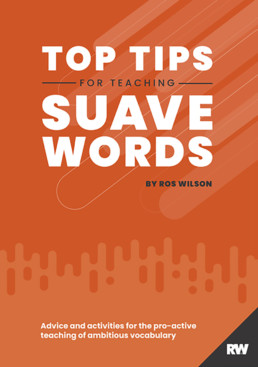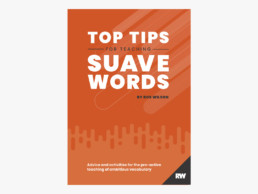Top Tips for Teaching Suave Words
Updated 01/09/2023
As so often happens, the more I watch children at work in the classroom on Talk:Write and the more I talk with talented teachers, the more examples and ideas for additional support spring to mind. It was this behaviour that led to the generation of over 900 quality resources that are already available on our free resources page, with new ones being added all the time. It is as a result of this constant stimulation and reflection that I am working on the Top Tips for Teaching Suave Words book. The book is available now from our shop.
From the launch of the suave word of the week, to the fun suave word champions sessions, this book has it all and is mainly written in short, bulleted tips for quick and easy access. Dip in to read about assemblies, EAL, effective use of time, teaching across the curriculum and gen-up on a range of quick-fire activities to embed your latest suave word. Because important points are repeated in different sections when still applicable, this book can be read from cover to cover to ensure you are not missing a trick, or the busy teacher can quickly access a particular aspect that they need more ideas or support with.
Schools already successfully embedding the system need not fear that goal posts have moved, but everyone will be excited by some of the enrichment that has been provided through this addition to the programme.

Top Tips for Teaching Suave Words
A handy book with advice and activities for the pro-active teaching of ambitious vocabulary.
Top Tip for Launching the Suave Word of the Week
One example is avoiding the use of a pronoun for a new suave word when first launching it, instead the teacher should constantly use the new word in full throughout discourse and embedding activities. For example, instead of saying something like:
“Our new suave word of the week is ‘muse’. This is a delightful word and you will find you can use it in many subjects, both in speaking and in writing. Here is an example of how I have used it in a sentence. Please tell your friend what you think it may mean.”
The teacher may instead say:
“Our new suave word of the week is ‘muse’. Muse is a delightful word and you will find you can use muse in many subjects, both in speaking and in writing. Here is an example of how I have used muse in a sentence. Please tell your friend what you think muse may mean:
‘I was musing about the life of the baby lambs in the snow on the moors.’
“Now, what do you think muse might mean? That’s a very good guess. It means to think about or to reflect. Well done. Now, quick as a flash, spell muse. And spell muse again. And spell muse again. Well done everyone. Now I would love to hear you all using muse in your talk or see you use it in your writing.”
This constant repetition of the word would not be considered good practice in normal speech or writing, but because the teacher wants to embed the new word for all children, the constant re-use is a deliberate ploy that really is effective.
Suave Word Champions
Another great tip from the new book is the suave word champions. On the last day of the school week, each class has an internal contest. This may only take about ten to fifteen minutes at the start or close of an English lesson or between any other two lessons, and is mainly played through ‘fastest shout first’. The teacher will suddenly fire the suave word of the week at a small cluster of pupils and they all have to shout the spelling back. The fastest to complete scores a point. This is then repeated for the definition and for the use of the word in a made-up sentence. The child or children winning the most points is the class suave word champion of the week. We have a selection of four certificates available to download from the free resources page.
Suave Word Assembly
The climax is reached the following week in the suave word assembly. This assembly usually opens with a rapid ‘fastest shout first’ review of the past few week’s suave words with their spellings and meanings. The new suave word of the week is then introduced and the meaning given with an illustration of its use. The final celebration of the assembly is the suave word champions of the week, when the class winners of the previous week play off against each other to find the school suave word champion of the Key Stage for the week. There is a free suave word assembly resource on the free resources page.
In the Staffroom
One of the fun comments we have received from headteachers during this whole launch has been that, not only are children rapidly expanding their knowledge and use of enriched vocabulary – but so are many of the staff and there is frequently great laughter in the staff room as teachers vie to use the most new suave words of the week in discussions and chat as they go about their daily business!
What a privilege to work with our amazing profession!
Talk:Write
A fun and flexible approach to improving children’s vocabulary, speech, and writing.


